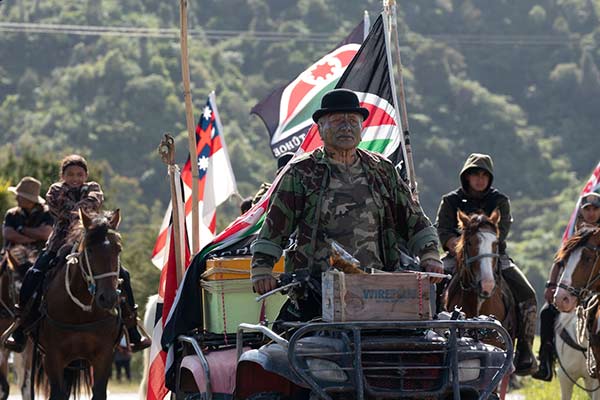New Zealand born writer/director Tearepa Kahi draws inspiration from nearly 100 years of volatile relations between New Zealand’s Indigenous communities and colonial government bodies in his gripping and emotionally intense new film 'Muru’.
Inspired in part by the police raids of Tuhoe in 1916 and the domestic terrorism raids (Tuhoe 2007), ‘Muru’ tells the story of Māori sergeant 'Taffy' Tawharau, whose quiet life is turned upside down when his small community in the remote Ruatoki Valley of Aotearoa (NZ) is raided by an anti-terrorism taskforce seeking to arrest community leader Tame Iti (played by himself). As tempers flare and accusations fly amid mounting tension a devastating chain of events is triggered and Taffy soon finds himself torn between standing with his community and honouring his duties as a police officer.
Cliff Curtis delivers an emotionally charged performance as Taffy, a quiet, well-meaning man struggling to reconnect with his community while caring for his ailing father. Although barely hinted at, Taffy’s absence and subsequent return has profoundly impacted his relationships within the community and those obvious feelings of mistrust and anger work against him as he struggles to maintain order amid the chaos. Jay Ryan delivers an impressive performance as taskforce leader Gallagher, an ambitious young man whose strong moral compass is constantly tested by the rapidly changing turn of events unfolding around him. Manu Bennett is intense as officer Kimiora, a man whose own unspoken internal struggles see him switch between dedicated officer and loose cannon with frightening ease. Simone Kessell and Ria Paki star as Maria and Blake, officers caught on opposing sides of an increasingly complicated situation.
With a full face of traditional Māori tattoos, political activist and leader Tame Iti is an imposing individual who commands your attention and his obvious pride in his culture shines through in a powerful performance which mirrors his own arrest in the 2007 raids (while no terrorism charges were laid, he was charged with firearm offences).
Strong scriptwriting brings a beautifully flawed cast of characters to life, expertly interweaving their narratives to create a multifaceted story which allows the audience to experience the events of ‘Muru’ from multiple perspectives. We bear witness to the events and decisions that led to the deployment of the taskforce, experience the frantic desperation of the raid through Taffy’s eyes as he struggles to gain his community’s trust while staying true to his own deeply held sense of honour and duty; feel the fear of the community members caught in the crossfire and see the political and emotional toll the raid takes on the officers involved. The result is a profound viewing experience which leaves viewers feeling the pain of those on both sides of the conflict and wondering how things could have been done differently.
Performed largely in Te Reo Māori, ‘Muru’ showcases the stunning natural beauty and rich culture of New Zealand while exploring themes of community, belonging, cultural identity, justice and honour. Named after a Māori process for righting wrongdoings, ‘Muru’ is a poignant look at what can happen when Indigenous traditions come up against colonial ideals. Thought-provoking and full of heart.
‘Muru’ is in cinemas now. It was recently awarded the Asia Pacific Screen Academy Cultural Diversity Award.

